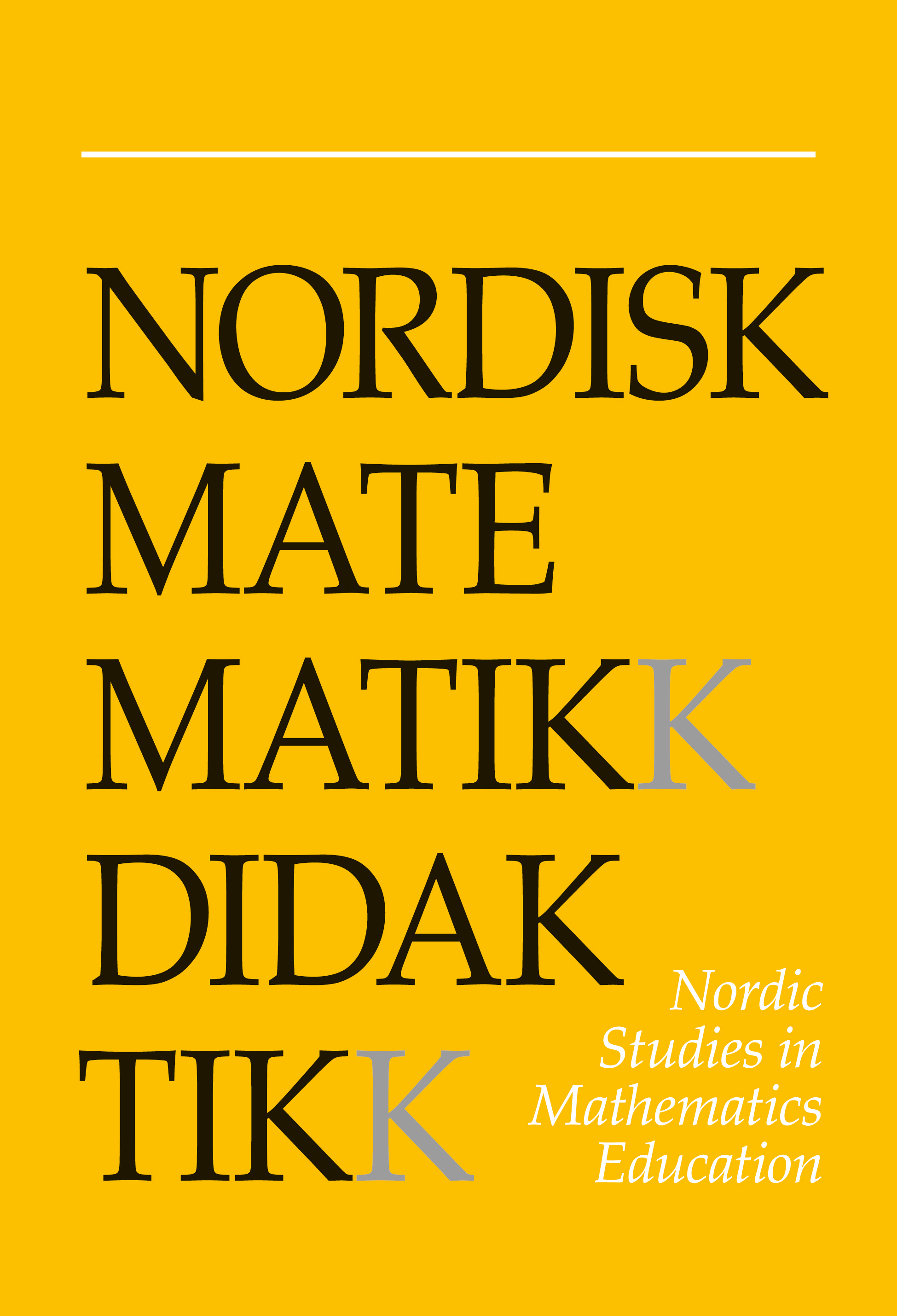Homework and minority students in difficulty with learning mathematics – the influence of public discourse
DOI:
https://doi.org/10.7146/nomad.v13i4.148139Abstract
In this paper, I contrast an immigrant 10 years old girl’s perception of her home support and her mathematics teacher’s rather different perception. I show how the girl tries to align her perception of her home support with middle class Danish family values, and how the public discourse about immigrants apparently frames the teacher’s per- ception of the resources that are available or not available to the girl. The analysis becomes an example of how mathematics teaching and learning are embedded in a wider socio-political field. It suggests that sometimes resources could be available that schools do not see because students are constructed as disadvantaged.
References
Abreu, G. de (2005). Cultural identities in the multiethnic mathematical classroom. In M. Bosch (Ed.), Proceedings of the Fourth Congress of the European Society for Research in Mathematics Education, (pp. 1131-1140).
Abreu, G. de & Cline, T. (2007). Social valorization of mathematical practices: the implications for learners in multicultural schools. In N.S.Nasir & P. Cobb (Eds.), Improving access to mathematics: diversity and equity in the classroom (pp. 118-131). New York: Teachers College Press.
Alrø, H., Skovsmose, O. & Valero, P. (2008). Inter-viewing foregrounds: students' motives for learning in a multicultural setting. In M. César & K. Kumpalainen (Eds.), Social interactions in multicultural settings. Rotterdam: Sense Publishers. https://doi.org/10.1163/9789087907174_003
Anthony, G. & Walshaw, M. (2007). Effective pedagogy in pāngarau/ mathematics: best evidence synthesis iteration (BES). Wellington: New Zealand Ministry of Education. Retrieved January 14, 2009 from http://www.educationcounts.govt.nz/publications/series/2515/5951
Booth, T., Ainscow, M., Baltzer, K. & Tetler, S. (2004). Inkluderingshåndbogen. København: Danmarks Pædagogiske Universitet.
Bratton, J., Civil, M. & Quintos, B. (2005). Engaging with parents on a critical dialogue about mathematics education. In M. Bosch (Ed.), Proceedings of the Fourth Congress of the European Society for Research in Mathematics Education (pp. 1182-1192). Retrieved January 14, 2009 from http://ermeweb.free.fr/CERME4/CERME4_WG10.pdf
Civil, M., Díez-Palomar, J., Menéndez, J. M. & Acosta-Iriqui, J. (2008). Parents' interactions with their children when doing mathematics. Adults Learning Mathematics: An International Journal, 3 (2a), 41-58.
Danmarks Evalueringsinstitut (2007). Undervisning af tosprogede elever i folkeskolen. København: Danmarks Evalueringsinstitut. Retrieved January 14, 2009 from http://www.eva.dk/projekter/2006/tosprogede-elever-i- folkeskolen
Danmarks Statistik (2007). Indvandrere i Danmark 2007. København: Danmarks Statistik. Retrieved January 14, 2009 from www.dst.dk/ebog/ indvandrereidk
Egelund, N., Jensen, P. & Tranæs, T. (2007). PISA Etnisk 2005: kompetencer hos danske og etniske elever i 9. klasser i Danmark 2005. København: Rockwool Fondens Forskningsenhed.
Egelund, N. & Rangvid, B. S. (2005). PISA-København 2004. København: PISA- konsortiet og Københavns Kommune. AKF forlaget.
Gilliam, L. & Gitz-Johansen, T. (2007). PISA etnisk - spiller skolen ingen rolle? Dansk pædagogisk tidsskrift, 2007 (3), 74-77.
Goodson, I. F. (2005). Lærende liv. In R. Ådlandsvik (Ed.), Læring gjennom livsløpet (pp. 77-100). Oslo: Universitetesforlaget.
Goodson, I. F. & Sikes, P. J. (2001). Life history research in educational settings. Buckingham: Open University.
Holmen, A. (2008). Dansk som andetsprog i den flerkulturelle skole. In J.Bundsgaard (Ed.), Positioner i danskfagets didaktik. (CURSIV nr. 2 2008) (pp. 59-76). Institut for Curriculumforskning, Danmarks Pædagogiske Universitetsskole ved Aarhus Universitet. Retrieved January 14, 2009 from http://www.dpu.dk/site.aspx?p=12829
Inglis, S. (2005). A two-way street: homework in a social context. Centre for Education, Auckland College of Education. Retrieved October 29, 2007 from http://www.education.auckland.ac.nz/uoa/fms/default/education/docs/ word/research/foed_paper/issue15/ACE_Paper_8_Issue_15.doc
Kvale, S. (1996). InterViews. An introduction to qualitative research interviewing. Thousand Oaks: Sage Publications.
Lange, T. (2007). Students' perspectives on learning difficulties in mathematics. In L. Ø. Johansen (Ed.), Proceedings of the 3rd Nordic Research Conference on Special Needs Education in Mathematics (pp. 171-182). Adgangskursus, Aalborg Universitet.
Lange, T. (2008). The notion of children's perspectives. In D. Pitta-Pantazi & G. Philippou (Eds.), Proceedings of the Fifth Congress of the European Society for Research in Mathematics Education (pp. 268-277). Department of Education, University of Cyprus: European Society for Research in Mathematics Education.
Lange, T. & Meaney, T. (2008). I actually started to scream: doing school mathematics homework. Manuscript submitted for publication.
Marzano, R. J. & Pickering, D. J. (2007). The case for and against homework. Educational Leadership, 64 (6), 74-79. Retrieved October 29, 2007 from http://www.marzanoandassociates.com/pdf/homework.pdf
Merttens, R. (1999). Family numeracy. In I. Thompson (Ed.), Issues in teaching numeracy in primary schools (pp. 78-90). Buckingham: Open University Press.
OECD (2004). Learning for tomorrow's world. First results from PISA 2003. Paris: OECD. https://doi.org/10.1787/9789264006416-en
OECD (2006). Where immigrant students succeed - a comparative review of performance and engagement in PISA 2003. Paris: OECD. https://doi.org/10.1787/9789264023611-en
Rockwool Fondens Forskningsenhed (2007a). Nyt fra Rockwool Fondens Forskningsenhed maj 2007. København: Rockwool Fondens Forskningsenhed. Retrieved January 14, 2009 from http://www.rff.dk/da/ publikationer/nyhedsbreve/2007
Rockwool Fondens Forskningsenhed (2007b). Nyt fra Rockwool Fondens Forskningsenhed september 2007. København: Rockwool Fondens Forskningsenhed. Retrieved January 14, 2009 from http://www.rff.dk/da/ publikationer/nyhedsbreve/2007
Shumow, L. (2003). The task matters: parental assistance to children doing different homework assignments. The School Community Journal, 13 (2), 7-23.
Valero, P. (2002). Reform, democracy, and mathematics education. Towards a socio-political frame for understanding change in the organization of secondary school mathematics. Copenhagen: Department of Curriculum Research, The Danish University of Education.
Valero, P. (2007). A socio-political look at equity in the school organization of mathematics education. ZDM. The International Journal on Mathematics Education, 39, 225-233. https://doi.org/10.1007/s11858-007-0027-2
Downloads
Published
How to Cite
Issue
Section
License

This work is licensed under a Creative Commons Attribution-NonCommercial-ShareAlike 4.0 International License.



